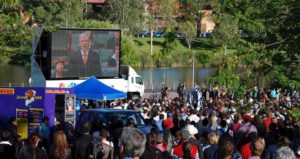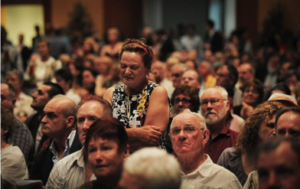Formal Apologies: What do they mean? Do they matter?

The Prime Minister has set up a committee to provide advice on a proposed national apology to Australians who were sexually abused as children. (See more here.)
There are many things we’ve learned from past apologies.
Care Leavers and survivors of child abuse have inspired an apology landslide in the past twenty years. Professor Kathleen Daly made a valiant attempt to count them. In Australia alone, she has documented more than 60.[1] And even her eagle eyes missed some! Never mind the quantity, feel the sincerity!
Many Care Leavers would agree that these apologies vary in genuineness. Intention and effect are not necessarily the same. We hear apologies in a variety of ways. We know the difference between someone who acknowledges—even with ‘deep regret’—that a wrong was done, and another person who names the crimes and pledges to do everything in their power to put things right and commits to ensuring such crimes never happen again.
Words really matter—even when an apology is denied. For instance, when Prime Minister Howard refused to offer a national apology to the Stolen Generations in 1997, and offered instead a statement of “sincere and deep regret”, he offended not only Indigenous Australians but many decent non-Indigenous too. It would take another eleven years—and a different Prime Minister—before a heartfelt apology was offered, and was warmly received.
Howard’s language was not accidental. He was advocating, for the ears of “mainstream Australia”, a particular reading of Australian history. And, it has to be said, many non-Indigenous Australians preferred his version to the much-derided “black-armband view” of our history. In Howard’s view, the disgraceful treatment of Indigenous Australians was “a blemish” on an otherwise good record.
On the other hand, while Prime Minister Rudd’s 2008 “apology without reservations” was initially hailed as an historic moment, it was soon revealed to be seriously flawed. Rudd named “the hurt, the pain and suffering…the indignity, the degradation, and the humiliation”, but he offered nothing tangible to make amends for that shameful past. Indeed, it is now clear that he opposed reparations. His Minister for Indigenous Affairs at the time is still calling, ten years on, for the Commonwealth to take its share of responsibility with the States to make reparations and pay compensation.[2]

In contrast, in the following year, Rudd apologised to Care Leavers (using the term “Forgotten Australians” which many find objectionable) and British Child Migrants, and was ready and positioned to announce a number of tangible measures—albeit short of financial redress.[3]
That national apology was highlighted by the spontaneous and sustained applause by Care Leavers to Malcolm Turnbull, then Leader of the Opposition, when he uttered the words, “We believe you”; although some in the audience thought he had crossed a rhetorical bridge too distant when he went on to tell them he loved them. One was heard to mumble, “Yeah, I’ll bet he loves fish and chips too!” Trust has to be earned.

The witness box of the recently completed Royal Commission into Institutional Responses to Child Sexual Abuse offered opportunities to add to the litany of formal apologies. Some of these were apparently heartfelt while others were predicably formulaic. For example, reading a prepared script—as Cardinal Pell did—without making eye contact with the survivor—John Ellis, sat close by—was never likely to ring true.
An apology offered as a big public event where emotions are heightened can raise hopes and expectations of significant change. When the euphoria fades, Care Leavers may come to assess it as nothing more than the apologiser laying an expectation on the receiver that they should now “get over it…get on with it”. A unilateral message to their real constituency: “Job done, we’re moving on.”
Too many apologies are like an abstract noun when they should be an active verb. One child and family welfare agency issued a formal apology in its glossy annual report without alerting former residents of the institution for which the agency is now responsible that it was going to make an apology. A university vice-chancellor issued an apology—little more than a media release—to those who were the subject of medical experiments conducted by its scientists. These are apologies as abstract nouns.
I want apologies to be an active process of negotiation. When you apologise, you enter into an open transaction with someone who has been hurt (not necessarily by you personally). You offer, they respond, you negotiate for a time around the terms and conditions, and finally, with goodwill, you agree on the nature, wording and form of the apology.
As Malcolm Turnbull gears up for yet another national apology, he would do well to address three elements:
- the language he uses to apologise
- the negotiations that need to take place with the recipients of the apology
- what tangible action he proposes to put things right and to ensure that the crimes for which he is apologising don’t happen in the future.
The lack of due diligence on any one of these three pillars will lead to the proposed apology being a dismal failure – it will be rejected by large numbers of those the Prime Minister is apologising to.
Footnotes
[1] Kathleen Daly, Redressing Institutional Abuse of Children, Palgrave Macmillan, 2014, pp. 237-246.
[2] Jenny Macklin, “How We Said Sorry: Reflecting on the Apology: a Decade On”, Meanjin, March 2018
[3] http://pandora.nla.gov.au/pan/110625/20091116-1801/www.pm.gov.au/node/6321.html
2 thoughts on “Another Apology”
Comments are closed.
Good article.
Thanks Madeleine. I’m trying to keep up, but it’s hard.